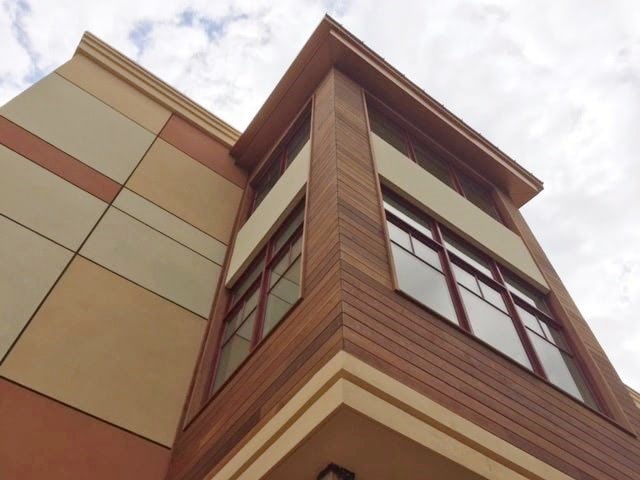
RAINSCREEN WOOD SIDING TYPES
CLIMATE-SHIELD® RAINSCREEN SYSTEM™
A wide variety of wood siding species are available for use with the Climate-Shield® Rainscreen System. Some of the most popular and best performing wood cladding options include Mataverde® high density hardwood species such as Mataverde Ipe, Cumaru, Garapa, Jatoba, and FSC® Certified Machiche wood. These beautiful and long-lasting wood rainscreen cladding species are a perfect façade for the Climate-Shield® Rainscreen System.
Looking for more information about wood rainscreen siding?
Download the "Ultimate Guide to Wood Rainscreen Siding" now.
Ipe Hardwood Cladding
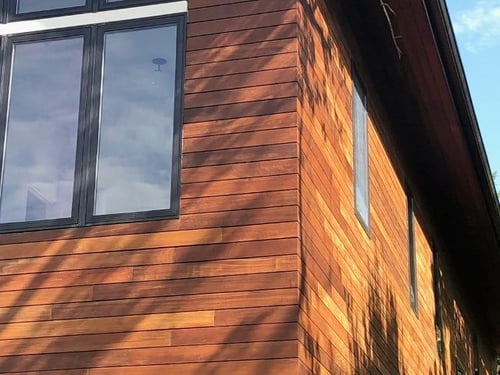
Ipe makes an impressive and long lasting rainscreen cladding material. The beautiful brown tones of Ipe add a warm visual appeal and the durability of Ipe rainscreen cladding material make it a natural for rain screen system installations.
Mataverde Ipe hardwood has been thoroughly tested and has received a Class A fire rating. Mataverde Ipe meets all the standard performance requirements for the ASTM E-84 testing for Class A building materials.
Ready for more Ipe wood cladding information?
Go to the Ipe Hardwood Siding Page here
DOWNLOAD THE IPE HARDWOOD SIDING FACT SHEET HERE
Machiche Hardwood
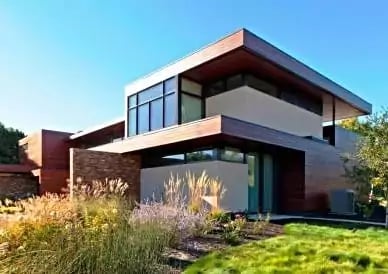
Mataverde Machiche FSC® Hardwood Cladding is another rugged and durable species available for wood rainscreen siding installations. Pronounced /mah-CHEE'-chay/, Mataverde Machiche hardwood siding has the same strength and high density characteristics as Machiche decking lumber.
Machiche hardwood siding has a naturally rich, chocolatey-brown color that can be enhanced with a natural oil finish, (we like and use Penofin Hardwood Formula Penetrating Oil Finish Sealant with UV protectant), or Machiche can be allowed to "naturally weather out" to a coveted silvery gray patina.
FSC Certified Machiche wood is an excellent sustainable cladding material option and has surpassed the ASTM test requirements for a Class A fire rating.
Ready for more Machiche cladding design ideas and information?
View the FSC Machiche Rainscreen Siding Projects Photo Gallery here
Go to the FSC Machiche Wood Siding Page now
DOWNLOAD THE FSC MACHICHE HARDWOOD SIDING FACT SHEET HERE
Garapa Hardwood
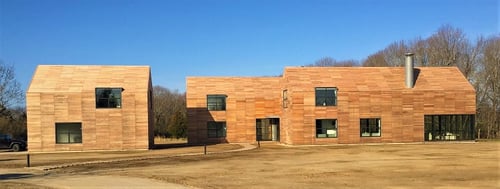
Mataverde Garapa Rainscreen Hardwood Siding is another rugged and durable hardwood; species available for rain screen installations. Pronounced /gah-RAH'-pah/, Mataverde Garapa hardwood siding has the same strength and high density characteristics as Garapa decking and Garapa lumber.
Garapa's rich natural golden tones can be enhanced with a natural oil finish or allowed to "weather out" and mature to a natural silvery patina. The exceptional stability of Garapa wood makes this lovely species an excellent choice for cladding material.
Ready for more Garapa cladding information and ideas?
View the Garapa Rainscreen Projects Photo Gallery now
Go to the Garapa Wood Siding Page here
DOWNLOAD THE GARAPA RAINSCREEN FACT SHEET HERE
Jatoba Hardwood
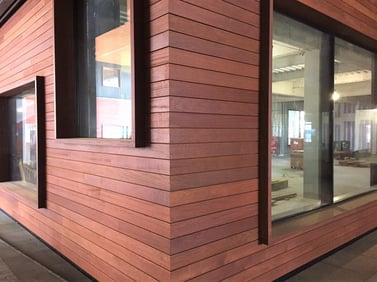
Mataverde Jatoba wood rainscreen screen siding is another handsome and durable wood siding species available for rainscreen designs and installations. Pronounced /ZHA'-toe'-Bah/, Mataverde Jatoba wood rainscreen siding has the same strength and high density properties as Jatoba hardwood decking and lumber.
Jatoba, often referred to as Brazilian Cherry, has rosy and reddish brown tones and medium to coarser graining. The rich coloration of Jatoba wood may be enhanced with a natural oil finish, such as Penofin Hardwood formula or a similar sealer. You can also allow Jatoba to "weather out" and age to a natural silvery patina. The exceptional stability, durability and strength of Jatoba wood makes this species a beautiful rainscreen cladding material option.
Ready for more Jatoba cladding information?
View the Jatoba Rainscreen Siding Projects Photo Gallery now
Go to the Jatoba Wood Siding Page here
DOWNLOAD THE JATOBA HARDWOOD SIDING FACT SHEET HERE
Cumaru Hardwood
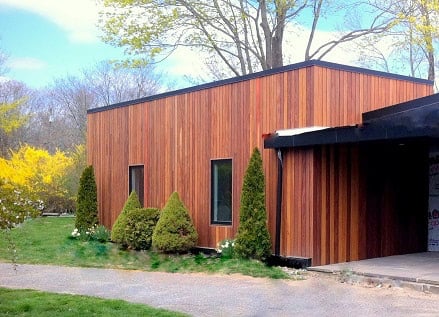
Mataverde Cumaru Hardwood Siding is another rugged and durable species available for wood rainscreen siding installations. Pronounced KOO'-mah-roo, Mataverde Cumaru cladding has the same strength and high density characteristics as Cumaru decking and Cumaru lumber.
Cumaru wood siding has rich reddish brown and yellowish brown colors whose exotic graining can be enhanced with a natural oil finish. Like Ipe hardwood siding, Cumaru wood siding can also be allowed to "weather out" and age gracefully to a natural silvery patina.
Mataverde Cumaru decking and siding has recently been tested and has surpassed the NFPA (National Fire Protection Association) requirements as a Class A fire rated building material.
Ready for more Cumaru cladding and design information?
View the Cumaru Rainscreen Siding Projects Photo Gallery now
Go to the Cumaru Wood Siding Page here
DOWNLOAD THE CUMARU HARDWOOD SIDING FACT SHEET HERE
Santa Maria Wood Rainscreen Siding
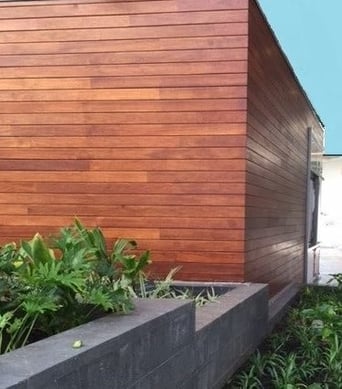
Mataverde FSC Certified Santa Maria Hardwood Rainscreen Cladding is a beautiful and durable hardwood species available for wood rainscreen siding installations. Mataverde Santa Maria hardwood cladding is quarter-sawn for excellent stability. Santa Maria wood has the lustrous appearance of genuine mahogany and can be stained different colors to complement your color scheme.
Like other high density and medium high density hardwoods, Santa Maria can be allowed to weather naturally to a silver-gray patina or it can be re-finished as needed to maintain its rich coloration and graining. Santa Maria siding can also be stained in a wide range of colors.
FSC Santa Maria hardwood siding is an excellent, sustainable rainscreen cladding material option.
Want more Santa Maria Hardwood cladding and design information?
DOWNLOAD THE SANTA MARIA HARDWOOD SIDING FACT SHEET
View the Santa Maria Rainscreen Siding Projects Photo Gallery
Mataverde ThermaWood™ Hem-Fir
Thermally Modified Hemlock
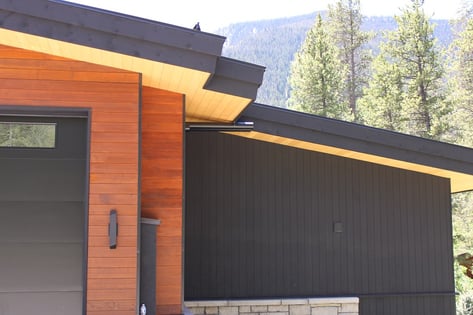
Mataverde ThermaWood™ Hem-Fir is a beautiful and high performance cladding option. Mataverde Thermally modified hemlock is a North American domestic wood species that has been thermally modified to exceed the performance of the original wood species. The unique thermal modification process for Hem-Fir employs a specialized vacuum kiln, under pressure, so the wood doesn't need extremely high temperatures to 'cook out the sugars' to make it insect and rot resistant. Mataverde thermally modified hem-fir performs extremely well in both exterior and interior designs and installations. Works well for cladding, soffit and trim applications. Finish with oil based paints or stains for best results.
Mataverde ThermaWood cladding is real wood - the remarkable process strengthens and stabilizes it for exterior use. Mataverde is a sustainable natural wood cladding solution for rainscreen projects and other siding applications.
Ready for more ThermaWood™ Hem-Fir siding information?
View the ThermaWood Rainscreen Siding Projects Photo Gallery now
Go to the ThermaWood Wood Siding Page here
DOWNLOAD THE THERMAWOOD HEM-FIR SIDING FACT SHEET HERE
Mataverde Thermally Modified Hardwood
Thermally Modified Hardwood
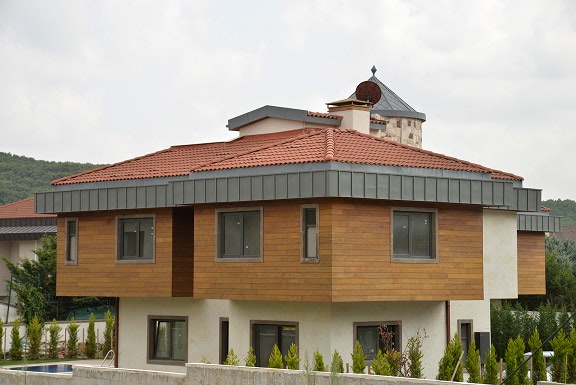
Mataverde Thermally modified hardwood siding is a unique hardwood cladding product with exceptional stability. It is real wood siding material that has been embraced by architects and designers worldwide, to create and enhance beautiful and enduring project designs from the Arctic Circle to Africa and far beyond. It is a sustainable, natural wood cladding solution for rainscreen siding and other outdoor projects.
Developed in Scandinavia, this thermally modified wood technology is an environmentally friendly, patented process that improves the natural properties of sustainable hardwoods and softwoods. The process uses no chemicals or toxins, only heat and water, and permanently modifies the cell walls of the wood. It is an all natural wood that improves the wood's characteristics and performance and gives the wood a rich brown color. After exposure to sun and rain, the wood develops a natural silver-gray patina. Performance is maintained, while beauty is enhanced.
Mataverde Thermally Modified cladding is real wood - the remarkable process strengthens and stabilizes it for exterior use. Mataverde is a sustainable natural wood cladding solution for rainscreen projects.
Ready for more Mataverde® Thermowood siding information?
View the Thermally Modified Hardwood Siding Projects Photo Gallery
Go to the Thermally Modified Hardwood Siding Page
DOWNLOAD THE THERMOWOOD RAINSCREEN FACT SHEET HERE
FSC® Massaranduba

FSC Certified Mataverde Massaranduba Rainscreen Hardwood Siding is a handsome and affordable hardwood cladding option for rainscreen wood siding installations. Pronounced MASS'-ah-ran-DOO'-bah, Mataverde Massaranduba hardwood rainscreen siding has rich colors ranging from light reddish browns to medium and darker reddish brown. Tropical graining and color variations make it a particularly striking cladding material.
Because of its deep colors, Massaranduba is sometimes referred to as "Brazilian Redwood". Massaranduba however is significantly harder than redwood - about 4 times harder - and its coloring can be enriched with exterior oil finishes such as Penofin.
Massaranduba Rainscreen is an excellent natural cladding choice for projects requiring a moderately priced, FSC certified wood siding material. Learn more about this beautiful wood siding species below.
DOWNLOAD THE MASSARANDUBA WOOD RAINSCREEN SIDING FACT SHEET
Wood Siding Species Comparisons
For additional information about other wood siding options and their potential compatibility
with the Climate-Shield Rainscreen System:
DOWNLOAD THE WOOD SIDING SPECIES COMPARISON CHART
If the wood siding species you are considering is not listed on the chart, please Contact our Specialists.
Would you like to see for yourself? Request wood siding samples today.
Ready to see fantastic rainscreen projects using wood siding materials?
Download the Featured Wood Rainscreen Project Portfolio
Have a school or campus project coming up?
Download the Featured Wood Rainscreen Educational Project Portfolio
What types of wood siding are there?
There are lots of wood siding materials, available in either softwood or hardwood species. Softwood species such as red cedar, Douglas fir and redwood are popular, but require regular repainting or refinishing to hold up to outdoor weather. Hardwood siding species such as Ipe, Garapa, Machiche and Cumaru siding are longer lasting and beautiful, with tropical graining and exotic color variations. High density hardwood siding is very durable. Repainting or refinishing hardwood siding is an appearance option but is not required.
How does wood rainscreen siding work?
Wood rainscreen cladding means any wood siding that is installed as part of a rainscreen system. There are lots of rainscreen methods to install cladding and lots of material options. Once you choose your wood siding species, it will look pretty much the same from the outside, no matter what rainscreen installation method you select. But it’s what’s going on behind the siding that makes all the difference. The best rainscreen methods will protect your siding and your home or structure better, and much longer.
How does a wood rainscreen work?
All wood rainscreen methods leave a gap behind the wood siding to allow it dry out, which makes both the siding and the wall assembly less prone to rot and decay. But some methods are much more effective than others. Using furring strips to create a rainscreen is OK but is certainly not the best way. The best rainscreen method is to allow ventilation at the top and bottom of the wall, and ventilation between the siding boards, without using furring strips.
How much rainscreen do I need?
One you decide which exterior walls you will install rainscreen siding on, simply measure the wall area. Multiply your wall height times your length to calculate your overall square footage. Then deduct the square footage of windows and doors (where you will not be using siding). Then add a waste factor for trimming and cutting your rainscreen siding to fit.
Typical Example of How to Measure Your Project for Wood Siding:
|
Measure |
Do the math |
Calculate |
|
Overall wall size is 10’ high and 40’ long |
10 feet x 40 feet = 400 square feet |
400 SF |
|
Deduct square footage of windows |
5 windows at 3’ x 5’ each = 75 square feet |
-75 SF |
|
Deduct square footage of doors |
1 door at 3’ x 6’-8” = 20 square feet |
-20 SF |
|
Subtotal |
305 SF |
|
|
Add waste for trimming and cuts |
Add 10% (305 x .1 = 30.5 square feet) |
+ 31 SF |
|
Total siding you need to order |
336 SF |
How long will wood siding last?
The better the rainscreen system, the longer your wood siding will last. The better the species, the longer your wood siding will last. Softwood sidings must be refinished or repainted to extend their lifetime.
High density hardwood siding lasts much longer. If you choose to let your hardwood siding ‘silver out’ to a driftwood patina, no refinishing is necessary. Hardwood siding installed in an appropriate rainscreen should last for at least 25 years or longer.
Is wood siding better than vinyl?
It really depends on what you are looking for in a siding material. Vinyl siding is lower cost than wood siding. And vinyl siding is easier to care for than any wood siding that needs to be repainted or refinished. If you want your hardwood siding to weather to a silvery gray appearance, the maintenance is about the same as vinyl siding.
From an appearance standpoint vinyl siding comes in many colors and styles. But cheap vinyl siding looks cheap. It covers your house but doesn’t help your property value. Higher grades of vinyl siding look better, but at the end of the day, vinyl siding is still plastic. If you love the warm natural beauty of real wood, nothing compares to the look and value of hardwood siding.








